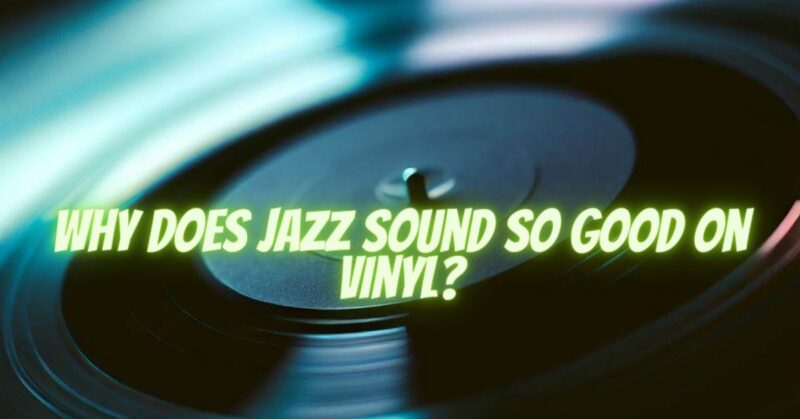Jazz, with its improvisational spirit and soulful melodies, has long been hailed as a genre that shines on vinyl records. Many enthusiasts argue that the intimate and expressive nature of jazz is enhanced when experienced through the warm, analog sound of vinyl. In this article, we will explore the reasons why jazz sounds so captivating on vinyl, delving into the characteristics of the genre and the unique qualities of vinyl records that contribute to an immersive and authentic jazz listening experience.
- Analog Warmth and Presence:
Vinyl records, known for their analog warmth, add a distinct sonic character to jazz recordings. The medium’s inherent analog nature captures the nuances of jazz performances, including the delicate interplay between instruments, the subtle inflections in a musician’s expression, and the palpable energy of live sessions. The vinyl format’s ability to convey the warmth and presence of jazz recordings enhances the listener’s connection to the music, creating an immersive experience that can transport them to the very heart of the performance.
- Dynamic Range and Instrument Separation:
Jazz compositions often feature intricate arrangements with multiple instruments playing in harmony or taking turns to solo. Vinyl records, with their wide dynamic range, allow for greater instrument separation and clarity. The vinyl format’s ability to reproduce subtle details and intricate musical interactions enables listeners to discern the nuances of each instrument, amplifying the depth and complexity of jazz recordings.
- Authenticity and Vintage Aesthetic:
Jazz has deep roots in the vinyl era, and many classic jazz albums were originally released on vinyl. Listening to jazz on vinyl adds an authentic and vintage touch that can evoke nostalgia and a connection to the rich history of the genre. The physicality of handling a vinyl record, carefully placing the needle on the groove, and experiencing the warm crackles and pops contribute to the overall ambiance and appreciation of jazz as a timeless art form.
- Intimate and Engaging Listening Experience:
Jazz is often associated with intimate settings, such as small jazz clubs or cozy lounges, where the audience can immerse themselves in the music and engage with the performers on a personal level. Vinyl records, with their tactile and immersive nature, invite listeners to have a similar intimate experience at home. The act of selecting an album, examining the cover art, and settling into a focused listening session fosters a deeper connection with the music, allowing jazz to envelop the listener in its captivating world.
- Preservation of Historical Recordings:
Vinyl records have played a vital role in preserving jazz’s historical recordings. Many classic jazz performances and iconic albums were originally released on vinyl, and the format has contributed to the preservation and appreciation of these musical treasures. Listening to jazz on vinyl allows for a direct connection to the original recordings, honoring the authenticity and artistry of the musicians who have shaped the genre.
Conclusion:
Jazz and vinyl records share a profound connection, with the medium enhancing the essence and allure of the genre. The analog warmth, dynamic range, instrument separation, and vintage aesthetic of vinyl contribute to a captivating and immersive jazz listening experience. Whether it’s the expressive solos, the intricate ensemble interplay, or the soulful melodies, jazz finds a perfect partner in vinyl, enriching the authenticity and intimacy of the music. So, sit back, put on a jazz record, and allow yourself to be transported to a world where the sound of vinyl harmonizes with the soul of jazz.


